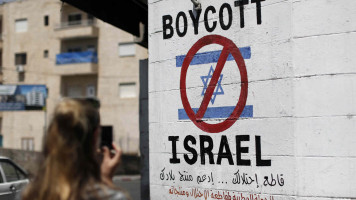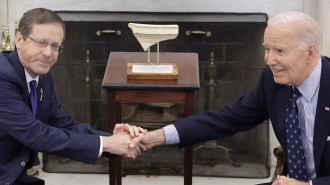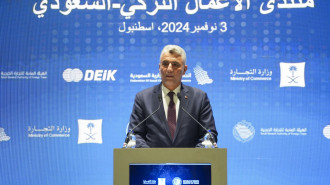Israeli minister boasts his country has been 'killing Iranians'
An Israeli minister boasted that his country was the only one that "has been killing Iranians", after tensions between Britain and Iran rose in the Gulf.
Regional Cooperation Minister Tzachi Hanegbi's comments to public radio were a reference to Israeli strikes in neighbouring Syria against Iranian and Hizballah military targets.
But they came after Iran seized a British-flagged tanker on Friday, adding to tensions between Washington and Tehran linked to a 2015 nuclear deal.
Hanegbi accused Iran, Israel's main enemy, of seeking to create "chaos" and "harm freedom of navigation."
Asked if he feared that Israel would not receive the backing of the United States in the case of a conflict with Iran, Hanegbi suggested that Tehran would avoid such a scenario.
"Israel is the only country in the world that has been killing Iranians for two years," he said.
"We strike the Iranians hundreds of times in Syria. Sometimes we acknowledge it and sometimes foreign reports reveal it."
He added that the Iranians "understand that Israel means business."
Israel has carried out hundreds of strikes in Syria against what it says are Iranian and Hizballah military targets.
It has vowed to keep Iran from entrenching itself militarily there.
Prime Minister Binyamin Netanyahu spoke in a similar vein last week with cadets at the national security college.
"At the moment, the only army in the world to fight Iran is the Israeli army," he said.
Earlier this month, Netanyahu warned that Israeli fighter jets "can reach anywhere in the Middle East, including Iran".
The Israeli PM was reacting to comments made by Hizballah's leader, Hassan Nasrallah just a day earlier.
In an interview on Friday, Nasrallah said that his group is much stronger than during the 2006 war and is capable of striking anywhere in Israel. Pointing to a map, Nasrallah identified a list of targets he said his group could strike, saying "in all fields, the resistance has developed in quantity and quality."
Nasrallah added that "any war will be bigger than the 2006 war for Israel and it will put it on the brink of extinction".
The Lebanese Shia group battled Israel to a stalemate in a month-long war in 2006 and has since gained valuable battle experience in the Syrian civil war.
Over the past 13 years, Israel has carried out dozens of airstrikes against suspected weapons shipments from Iran through Syria to Lebanon and has engaged in several dust ups. But its field training has been primarily aimed toward delivering a far more decisive victory in its next full-scale war with Hizballah.
not to subordinate Lebanon to Iran's agenda, and we caution Lebanon not to be used as a launching pad for attacks against Israel."
"We are not happy to go to war, but the military is fully prepared to respond to any threat and any scenario," Rivlin said.
Tanker tensions
Iran's seizure of a British-flagged tanker in the Strait of Hormuz for breaking "international maritime rules" came some two weeks after Britain seized an Iranian tanker at the mouth of the Mediterranean on allegations of breaching UN sanctions against Syria.
Iran's move against the UK-flagged oil tanker prompted international condemnation and ministers in the UK reportedly considering freezing Iranian assets in response.
Foreign Secretary Jeremy Hunt is expected to reveal the measures Monday, the Sunday Telegraph reported, and could include the re-imposition of EU and UN sanctions which were lifted as part of Iran's landmark nuclear deal.
The Foreign Secretary, speaking after a meeting of the Government’s emergency committee Cobra, said he told his Iranian counterpart Javad Zarif Saturday of his "extreme disappointment".
"This has to be about actions not words if we are to find a way through. British shipping must and will be protected."
The foreign office in London said it summoned Iran's charge d'affaires on Saturday.
The diplomat was called in as European powers urged Iran to release the Stena Impero oil tanker it seized in the Strait of Hormuz on Friday.
The seizure of two ships by Iranian authorities "is of deep concern", said a statement by the EU's foreign affairs office, which represents the bloc's 28 member states.
"In an already tense situation, this development brings risks of further escalation and undermines ongoing work to find a way to resolve current tensions," the statement said.
"We urge the immediate release of the remaining ship and its crew, and call for restraint to avoid further tensions," it said, adding that "freedom of navigation must be respected at all times".
London-based maritime security risk analysts Dryad Global said the "dramatic escalation" by Iran was likely to have been a calculated move.
The UK, Germany and France were the lead European powers that negotiated with Iran to curb its nuclear programme in a 2015 deal in return for the lifting of sanctions.
President Donald Trump has pulled the US out of the agreement and imposed sanctions to block Iran exporting its oil, much of which transits through the Strait of Hormuz.
Up to now, the UK, Germany and France had sought to keep the deal with Iran alive by setting up a trade mechanism not subject to the US sanctions, but rising military tensions in the Gulf have put that at risk.
Follow us on Twitter: @The_NewArab







 Follow the Middle East's top stories in English at The New Arab on Google News
Follow the Middle East's top stories in English at The New Arab on Google News


